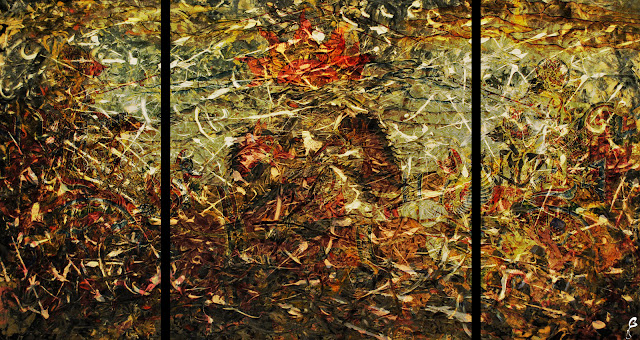While
reading the story of Mahabharata, we come across characters which teach us everything
we can will ever need to know in our life. Just a surface deep, lie every emotion
that crossed our heart, every thought that flew in our mind. The epic presents
a variety of situations, each representing in its own way the subtleties of life.
And then there are characters. Some are the incarnations of what one should not
be and their deeds directives of what should not be done: exampled by
Duryodhana, the foremost of the Kauravas, the villain in the epic in layman
terms.
We have
Krsna, the supreme personality, the perfect, revered, admired, a teacher, a
warrior, with a shrewd mind and an innocent smile. He is mysterious, not all he
does is understood, and that is what makes him more than a mortal. But we
assume he is right. And he is always on the winning side, even when he uses no
arms and fights against his own armies. He is God, his speech, Gita, is venerated,
to be followed.
Devaratta,
or Bhishma is another Goddess son, a figure so complete in himself. A warrior
without equal, a son who embraces celibacy for delights of his father, a
caretaker of the Bharata clan who watches the clan perish in the gory of the
battle, bonded by his vows. He is not clever like Krsna who plays with words
and smiles. He presents a curious and exciting dilemma much like the ones in
our lives, times where we know what is correct and to be done but watch things unraveling
in the wrong way helplessly.
Then we
have the Pandavas, the God-sons, whose fatherhood is always intensely debated
and always concluded in the perspective of them being correct, the rightful heirs
to the throne. Our society will have a very difficult task if we for a moment
conclude that they not being Pandu-putra, not at least biologically did not
have any claim to the throne in the first place. The five Pandavs in their own
right present the five important qualities in a man. They are all imperfect in
their own self, but together they are the perfect male. The youngest of
pandavs, Nakul and Sahadeva, who represent beauty and handsomeness loose prominence
in the narration, signifying the slight and feeble position these qualities
hold for a man. The Pandavs, Yudhistira, Bhimasena, Arjuna and the virtues integrity,
power and courage are greatly esteemed. The Mahabharata has made a very clear
distinction between being powerful and courageous, being brave and fearless.
Yudhistira,
the upholder of righteousness, presents before us a perfect king, a perfect moral
person, he is not exciting, just like the integrity of the rules he represents,
he in modern terms would be a person we would call a bore and refrain from
calling to adventure rides. He is also the person who losses his kingdom and
his ‘wife’ in a game of dice, and lies, if not technically to win a war. Then
we have Bhima, hopping across the line between good and evil. He is strong,
powerful but he is also haughty and arrogant.
Arjuna is the most upheld of all
Pandavas. Krsna was after all his charioteer, and revealed the Gita to him. He is
courageous and compassionate; he wants to find morality ‘Dharma’ in his actions.
He is powerful but not arrogant. He is the perfect disciple and an almost
perfect warrior. He is the again a character one can find most close to oneself
in the scheme of life, but he had Krsna in a way no one else had.
The
various characters of Mahabharata, their virtues, their problems and dilemmas present
before us situations we can relate to. But then stands Karna, the most
interesting and exciting character of the epic. Karna: the right man on the wrong
side. Our heart goes out to him, but he is not a character for pity. He is in
the real sense a hero but is not allowed to be one, wronged by all, his mother,
brother, teacher even God, yet stands up for himself. Unlike the other
characters of the epic, we not only learn from his vitures, actions but he in
one character we can relate to most easily.
Therefore
in my next few blogs I am going to share of how Karna, a central character of
the epic is actually the true representation of humans in the age of darkness or
the Kali-Yuga. The right man on
the wrong side: Karna.

Miya again a master-piece from you. The way you have narrated the epic story of Mahabharata is really impressive, specially the good qualities of particular characters and there implementation in our life is remarkable.
ReplyDeleteI'm writing this line because in our life we generally look for the bad habits and deeds of persons and its absolutely nice quality of a person to extract good habits from others..
Looking forward to read about the Karna part in your upcoming blogs..
Keep Writing and posting man...